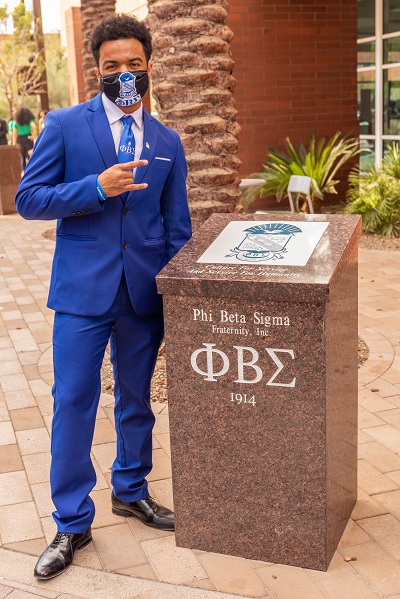Phi Beta Sigma: A brotherhood of scholarship and service
Phi Beta Sigma Fraternity Inc. was founded on Jan. 9, 1914, by three Black, male students at Howard University. Founders Honorable A. Langston Taylor, Honorable Leonard F. Morse and Honorable Charles I. Brown wanted to create an organization that benefited the general community and upheld three core principles: brotherhood, scholarship and service.
One hundred and seven years later, ASU’s Lambda Xi chapter of Phi Beta Sigma still lives by those three words.
Chapter President Style Ranger, a sophomore majoring in global management with a double minor in Spanish and philosophy, said he was drawn to the group because of their vision and their support for everyone.
“I was inspired automatically by the members’ authenticity and willingness to connect with me. They really valued the person that I am and supported me with or without me potentially joining. After I saw their principles and motto as well, I knew this was something that aligned with my future vision of being a part of something bigger,” he said.

Chapter President Style Ranger next to the Phi Beta Sigma plot at the ASU Greek Leadership Village. Photo by Asa Culver.
Phi Beta Sigma member Cobie Tahj said that historically Black Greek life in his fraternity in particular holds strong the value of accountability.
“We always hold each other accountable in every aspect of the word,” Tahj explained. “Whether it be in the classroom, whether it be the community, we try to uplift each other.”
Having extra support and accountability in the classroom is a must for Phi Beta Sigmas. It’s not enough to simply pursue a degree and graduate. Sigma brothers must excel.
“The more you excel in scholarship the less anybody can take that away from you,” Tahj said.
Working twice as hard for a fraction of the validation is a cautionary tale commonly passed down in minority communities.
“If you have a degree, if you have a strong background and a strong backbone in your life, there’s only so much wiggle room for you to go down the wrong path or have other people saying you're not worthy of certain things,” Tajh said.
The organization’s ideals forged a safe space for and by men living in unsafe times because of discrimination. This safe space fostered a brotherhood dedicated to inclusivity.
“I believe what sets our fraternity apart from any other is the emphasis on being yourself and defending one’s right to embrace who they are, no matter the race, religion or culture,” Ranger said. “Our fraternity is known for being a part of the general community rather than being apart from it. As a historically black fraternity branching into the support of all individual groups, we have stood at the tabernacle of fighting for one’s own civil and natural-given rights. We truly realize in this fraternity that we are all connected and motivate each other to expand on world-changing ideas.”
For this brotherhood, it’s all about action and service.
“As long as you want to make a difference, as long as you’re about brotherhood, scholarship and service, as long as you’re willing to make an impact in the community we don’t care what you look like,” Tahj said.
“Your gender, ethnicity, whether you’re gay, straight, bi, we try not to look at that stuff because at the end of the day, none of that matters. It’s the impact that you have on other people’s lives and in your life.”
The inclusivity doesn’t only extend to the Sigma brothers but also their Zeta sisters, with whom the brothers often collaborate in service and festivities. In 1920, Taylor helped inspire the establishment of Phi Beta Sigma’s sister sorority, Zeta Phi Beta Sorority Inc. Phi Beta Sigma and Zeta Phi Beta are the only organizations linked by constitutionally bound siblinghood in the Divine Nine. Naturally, Tahj says ASU Sigmas and ASU Zetas are as close as blood relatives.
“One of my sorors was struggling on the road. I think she had a flat tire. They [Sigma brothers] literally stopped what they were doing to go help her,” Tahj recalled. “It doesn’t matter where you are or what you're doing, somebody is willing to help you at all times. That’s who we are as a fraternity and sorority.”
The Sigma sense of community and camaraderie lends itself to the ASU campus and the broader Phoenix metropolitan area as well. Having a heart for the community includes having a heart for causes that struggle with awareness. Every year in November, ASU’s Phi Beta Sigma chapter hosts Sleep Out for the Homeless, an event that raises awareness and donations for students experiencing homelessness.
“Not a lot of people realize that there are college students that are homeless, whose families are going through tough times,” Tahj said. “We raise money, we get canned goods and clothing to donate to a local homeless shelter in the Phoenix metropolitan area.”
The brothers’ culture for service and community is something they’ll carry with them forever.
“I know that Phi Beta Sigma will always be a part of me. … Being a part of Sigma really taught me how to be the captain and master of my fate and soul, while also making sure to help the souls around me,” Ranger said. “ I learned the power of the collective WE, making anything is possible. In short, the experience I have and will continue to have has given me a beautiful and hopeful vision of the world and its relationship with the people in it.”
Learn more about Phi Beta Sigma Fraternity Inc. and ASU’s Lambda Xi chapter.
Additional reporting by Hannah Moulton Belec, EOSS Marketing